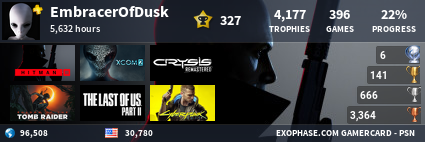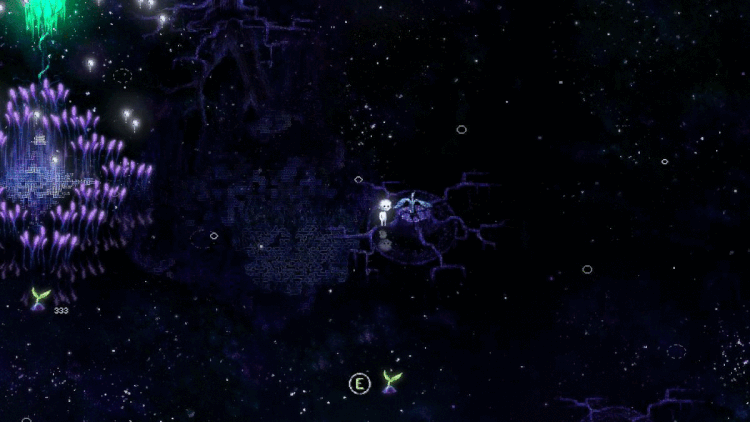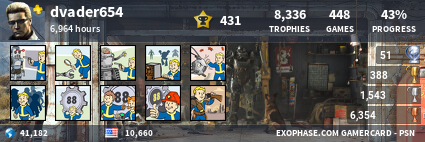Ohh nice topic. Storytelling in gaming for me is how well you are at telling your story, i know super complex  . But I have an extra requirement which is where I think my issues with this topic comes up. It seems to most all they need is an emotional connection and the story works for them. I go into a game expecting player interaction, if you treat me like a bystandard in the game I don't like it even if the story is amazing. And I don't mean my choices impacting the story, it can be a linear set story but I want to be involved in the game portion.
. But I have an extra requirement which is where I think my issues with this topic comes up. It seems to most all they need is an emotional connection and the story works for them. I go into a game expecting player interaction, if you treat me like a bystandard in the game I don't like it even if the story is amazing. And I don't mean my choices impacting the story, it can be a linear set story but I want to be involved in the game portion.
I have been thinking about this very topic cause I am playing Beyond right now and very much enjoying it. Like all Cage games the gameplay is nothing but a series of QTEs and some player choice but it works. Part of it is the presentation, the graphics are mindblowing. The acting and facial animations are better than anyone, I feel the acting in ways most games can't reach. So all those elements add to making the storytelling better. But most important for me, I still feel the game is made for me. Sure my interaction isn't the most stimulating but it's unique and it matters in certain parts. Contrast that to say a game like Gone Home where I felt I had no role, everyone has the exact same experience with that game, just the order and how much of it may see changes but nothing I do can change or really impact the "game" in anyway.
So for me it is of course inportabt to have a good story to tell but make sure there is still a reason for your experience to be a game, we are playing games not watching movies or reading books.
I'm right there with you, Steel. I'm shit at describing what makes a story click. I guess a fantastic story is one that makes me cheer for the protagonist and care for what happens. The Witcher 3 and MGS3 do this very well. The payoff in the Witcher, when we finally find Ciri, was just amazing because of the story told beforehand. Metal Gear Solid 3's story was just so satisfying that I cheered at the end. Unlike MGS2, where I had a wtf expression on my face because the story was so confusing and all over the place.
I hate when stories are told at the beginning then abandoned for the next twenty hours. Or when a story is completely unnecessary like in Mario Sunshine.
When a game is built around actually telling the plot in an interactive manner be it Planescape, Journey, Shadow of the Colossus, I'm into it, but the overly cutscene heavy stuff tends to be pretty lousy. Then there is the objectively terrible writing that you can find in video games, the completely nonsensical plot lines, and when shit is at its worst? You get a David Cage joint to test your tolerance for stupid shit. But not good stupid shit like Metal Gear Solid, Saints Row, or Binary Domain, but bad stupid like the man's ability to miss obvious as hell plot holes.
Adventure games are a little bit better in the story telling department, but they come with the issue that I think they full on point out exactly how poor of a story telling medium gaming is. They work mostly because they are as less of a game as humanly possible to make their scripts work. Which is the biggest issue when writing a video game story. At some point you have to write in gameplay, or interaction, or let the player take over, and that aspect makes it less of organic story telling medium. TV, Book, or Film? You just write the plot, and see where it takes you. A game? You have to set up gameplay, and that usually creates its own set of issues that go beyond just the basic failures of bad writing, or poor voice acting, or poor direction, or just lame concept, and of course one Fogg likes pointing out poor animations that makes everything look like a poorly put together puppet show.
That said I think there are exceptions besides Planescape, Journey, and Shadow of the Colossus
I quite dug things like Silent Hill, Mother 3, Ico, Spec Ops The Line (though the gameplay sucks, and I don't subscribe to the "it's intentional" excuse), and even something as recent as The Last of Us. Most of them I think if you take the story away from the gameplay it wouldn't work, but they work because they have a great harmony with the gameplay (for the most part).
As far as gamings best stories? It's a far cry away from competing with the best books have to offer or film has to offer. And given the past decade+ of television, it's a long fucking way away from delivering anything up to snuff with The Wire, Deadwood, or something like Friday Night Lights.

SteelAttack said:I am utter shit at analyzing the games I play and enjoy. That's part of the reason I never write reviews, I can't figure out how. But that doesn't mean I'm not interested in how other people analyze them, even though I don't necessarily mean regular game journos or reviewers. I mean you guys. One of the many elusive concepts I can never get right is storytelling. I see it talked about here and there and I even used it I guess from time to time but I don't particularly realize or fully grasp it. Maybe if someone asked me what I think it is I'd say it's the way the game story is delivered to the player, but I'm pretty sure that's not the gist of it. So I turn to you guys to make this thread a bit of a learning experience and share viewpoints on what are the important things to look after in an aspect of games that is often overlooked or deemed disposable: stories, plot, writing, characters.
I guess I'd start out asking all of you what is storytelling anyway? And which games are good examples of it done right?
Well, we had a conversation abuot this a few years back (I specifically remember you and foolz' contribution about story versus dialog, which fits along the lines of graphics versus artstyle in similur ways). And thank you for this kind fo thread, reminds me of the good GGD days.
All of the following is couched in the understanding that this is from 'my perspective' so I'll drop the usual experienced forum goer pleasantries of adding IMO type qualifiers throughout and tell you what I think.
Story telling is always reduced to the level of conflict. Always and forever. It is all our animal brains are capable of. Video games often get put down for being about guns, and for the most part that is true (there is some exploration in there( real world analog travel), some puzzles (same as real world puzzles), and the sim category, which is a really niche and cunningly meta but ultimately just a puzzle, but for the most part games too are just about conflict.
So traditional story telling and games are a perfect fit, regardless of how many smart kids raise their hands to object, "linearity". Because really, even the least liner of games is still just as limited as a "Choose" Your Own Adventure book.
This does not lessen the impact of story in games, it just mimics the limits of movies and television. At least with books you get to paint your own visual pictures, which far exceed any visual form in aesthetic, are far more vivid and depraved, even to the normal reader.
So it comes back to the best stories in games, and to me the best stories in games are those that we tell about games. The time we accidentally had to kill an entire village in Oblivion because we accidentally killed the barmaid. The time in GTA 3 we got up on to of a parking garage and sniped people for 2 hours and then road a ramp off the top into a lake, the time we had to get a load of oranges to Luxumbourg in Euro Truck Simulator, and the dance radio station distracted us to the point we passed the filling station and had to U-turn back. Those are the only worthy stories in games. The accidental ones.

The Legacy of Kain games were way ahead of their time in telling a great story in game form. Especially the first two games, Blood Omen and Soul Reaver on the PS1. I remember being blown away at how much it felt like a cimenatic movie, much like Metal Gear Solid. Just more focused on actual Gameplay.
I don't really know how to explain someone else's work on how they made a great story while others didn't. Its either there, or its not.

I think there have been some great stories in gaming. They're just not necessarily told in the way a movie or book would tell a story. It's too hard to try to tell a story in a traditional way since the writer has no control over the pace of the story. It can be done though. You just have to have the story elements coming in from multiple directions and sources.
Final Fantasy Tactics immediately comes to mind. If you read through all the in-game books, talk to the bartenders to hear their rumors, and play through all the storylines you'll find an amazing tale of a country in a civil war while you experience the events that play out behind the scenes. The pacing is done very well. Virtually every chapter tells the story with very little filler. Best of all, it's a genuinally good story. A civil war story that evolves into a power grab by a corrupt church. Good stuff.
Major Bloody Baron-related Witcher 3 spoilers follow. Hope this helps, Steel.
Story=the plot, literally just what happens. Sometimes (if not often) the story itself doesn’t actually matter much. And you can take any good story, and make it sound like complete shit in how you tell it.
Storyteling=how the plot unfolds; the thing that gives the plot impact. Not always, but very often the primary thing that makes a story immediately enjoyable.
The story of the Bloody Baron quest is basically: Fat dude hires anaemic man-witch to find his wife and daughter who have mysteriously disappeared, and anaemic man-witch agrees to help because the baron might know where his daughter in-law is; she has also mysteriously disappeared... But it turns out that the fat dude actually drove his main bitch and daughter away by being a dick for the past 20 years (but wifey was a cuckolding cunt, so yolo) and causing her to have a miscarriage. Anaemic man-witch finds his daughter in the big apple, but she hates her dad and is now a racist evangelist, and mummy’s run off to the convent—but been cursed by the evil, cannibalistic nuns in residence. After taking the baron to his main squeeze, she’s either insane and runs off into the hills with the baron to possibly be cured, or dies in his arms after the curse is removed (if you answer the quiz correctly), then the baron doesn’t give you your promised reward due to hanging himself—which is probably just to get out of paying you, the slippery prick.
Anyway…now the storytelling:
At the beginning of the Bloody Baron's quest, the storytelling makes it intriguing. As you're talking to him and exploring his house, it's obvious he's hiding something; and probably somehow partly to blame, and this impression is achieved with his defensive, suspicious dialogue and the clues Geralt uncovers. Here the story is that he’s hiding something, but the storytelling is what lets us know that he is, and also what makes this fact interesting.
The magic and voodoo doll stuff not only foreshadows the wife's crone-involvement, but also gives you a clue that the baron side quest is related to the witch side quest, which adds to the mystery by introducing new elements to the story, so that you want to figure out how they fit into what is actually going on.
But what really makes things interesting is how the exposition is handled, which allows the Bloody Baron to grow into a character you can actually empathise with. Because it's perfectly natural that Geralt’d be interrogating him, it never feels contrived or jarring that he goes on long monologues about his past. So although it's 100% exposition, it doesn't feel like exposition because of this simple trick. Without all that info he gave you he wouldn’t be an interesting character, but if he’d just been telling you without a good reason (he’s even reluctant to tell you early on, and only starts to talk as he becomes more desperate and guilty) it would have felt jarring, and would have made him a shallower, less interesting character—even though the story itself wouldn’t change. The important thing here is how the story is told.
The baron also tells you about his daughter not just himself, so when Geralt finally catches up to her, we already have an idea of what she’s like, which means the story doesn’t have to spend as much time establishing her—which is a good thing, because that would have made the pacing too slow. The story and her character also would not have been able to justify such exposition as it wouldn’t have helped much in Geralt finding her mother, which is her only interest in him. Thanks to the Baron’s exposition, she’s already partly established, and now meeting her only a little bit is needed so that we can believe in her. In fact, we might even feel sympathy towards her because the Baron is a dick and she obviously ran away willingly, even though the Baron says he idolises her.
The witch side of the two quests could have been handled a bit better in terms of both story and storytelling, I feel. Because Geralt can only talk to the Baron’s wife after she’s already out of her mind, it robs us of the closure we got with both the Baron and his daughter (even though the Baron himself gets his closure, selfish prick), and makes her into more of a plot device than a character in and of herself. But what did work about linking the two quests together was that the fate of the Baron and his wife were ultimately determined by something that had nothing to do with them personally, making the world seem a more complicated and harrowing place—which suits the tone of The Witcher 3 perfectly. But that’s a good thing about the story, not the storytelling.
Throw in a few nice little videogame storytelling touches along the way like the confrontation with the miscarriage monster that connected the story to the gameplay very well, as rather than just fighting random drowners in the bog, you’re actually directly involved in fighting (or protecting) something actually relevant to the plot, and you’ve got an okay story that is very well told.
But videogame storytelling is often bad because good storytelling can get in the way of good gameplay. Going back and forth between the bog and the Baron, hell just going back to him every five fucking minutes, was a pain in the arse and not at all enjoyable in terms of actual gameplay, but it had to be that way so that the story unfolded at the right pace; metering out little titbits of information to keep things interesting as you went along.

Editing doesn't work so.
Your point that great story telling and gameplay being incompatible is true. Look at the essense of both.
Story telling essense = "Sit down and let me tell you a story"
Gameplay = "discover a world and everything in it for yourself".
These divergent truths can not be reconciled.

aspro said:Editing doesn't work so.
Your point that great story telling and gameplay being incompatible is true. Look at the essense of both.
Story telling essense = "Sit down and let me tell you a story"
Gameplay = "discover a world and everything in it for yourself".
These divergent truths can not be reconciled.
Indeed, but I think those essences in the context of the discussion are a little narrow. Using those two definitions, though, if you separate one from the other completely, then the main thing you have to worry about is any clashing elements, like everyone's favourite complaint: the good-guy protagonist is actually a psychopath. (Though isn't this actually a problem in action stories full stop, not just games?) This obviously drastically limits what sort of story you can tell and what sort of game you can make without one negatively affecting the other; but you can separate them successfully. Uncharted does a decent job of separating the two; The Last of Us attempts to connect them, and that's one of its failures.
Or you could adapt storytelling techniques to the medium, rather than just copying them verbatim. Deadly Premonition, for instance, separated the gameplay from the story and had few clashing elements. But it also told a lot of the story (which you could easily miss, how videogamey is that?) through the AI's behaviour; if you followed the characters, or ran into them at the right time, you could pretty much predict the exact ending (if it wasn't easy enough already), and they also became much more interesting to boot. That's using one of the popular principles of prose writing: showing, not telling, but adapting it to the equivalent thing to prose in videogames (the indirect gameplay) rather than simply writing their cutscenes (cinema, not videogames) based on that principle.










I am utter shit at analyzing the games I play and enjoy. That's part of the reason I never write reviews, I can't figure out how. But that doesn't mean I'm not interested in how other people analyze them, even though I don't necessarily mean regular game journos or reviewers. I mean you guys. One of the many elusive concepts I can never get right is storytelling. I see it talked about here and there and I even used it I guess from time to time but I don't particularly realize or fully grasp it. Maybe if someone asked me what I think it is I'd say it's the way the game story is delivered to the player, but I'm pretty sure that's not the gist of it. So I turn to you guys to make this thread a bit of a learning experience and share viewpoints on what are the important things to look after in an aspect of games that is often overlooked or deemed disposable: stories, plot, writing, characters.
I guess I'd start out asking all of you what is storytelling anyway? And which games are good examples of it done right?